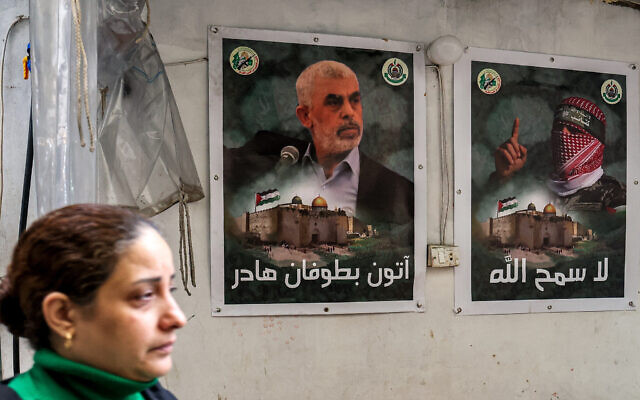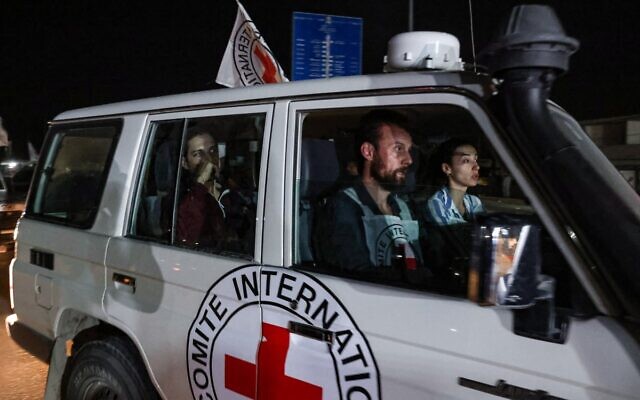



This month, Qatar announced the suspension of its mediation role between Israel and Hamas concerning a potential Gaza ceasefire and hostage release. At the same time, Doha refrained from confirming whether it would close Hamas’s office in the country, despite requests from the Biden administration to do so.
Qatar has hosted Hamas officials in Doha since 2012, when the terror group moved its headquarters out of Damascus amid the Syrian civil war; Washington had urged Qatar to serve as a conduit to the terror group, much as the Gulf state had done by hosting a Taliban embassy.
Even if the group were expelled from Qatar, it’s not clear who the order would apply to, with Hamas’s leadership structure made suddenly opaque by the killings of its last two chiefs Ismail Haniyeh and Yahya Sinwar in recent months.
Following the losses, the terror group has reportedly opted against appointing an immediate successor. Instead, a five-member committee based in Doha is said to have taken over leadership responsibilities.
According to Hamas sources speaking to AFP, the committee was set up in August following the assassination of Haniyeh in Tehran. While Sinwar was named head of the group, the fact that he was in hiding in Gaza made communication difficult, necessitating an alternative. When Israeli forces killed Sinwar on October 16, the quinquevirate stepped in.
The collective leadership structure could be a defensive strategy for Hamas, nominating five heads rather than a single chief who would immediately be in Israel’s crosshairs.
But the group also appears to want to present Palestinians with an “inclusive” leadership committee, one that spans Gaza and the West Bank and includes both political and religious figures, as it navigates a period of profound crisis for its future.
“This appears to be mostly a symbolic decision to indicate that all components of Hamas are represented,” said Hamas expert Guy Aviad, a former official in the IDF’s History Department, which maintains the military’s official annals.
“Joint leadership is not necessarily aimed at preventing targeted killings. If Israel wanted to eliminate a number of leaders, it could do so,” Aviad told The Times of Israel, adding that Israel is unlikely to conduct assassinations within Qatar or Turkey.
The current governance structure will be in place until the terror group holds elections for a new leader, which are scheduled for March next year, according to AFP.
There is also speculation that Hamas may have already secretly appointed a new leader but is concealing his identity, a tactic used in 2004 after the targeted killings of leaders Sheikh Ahmed Yassin and Abdel Aziz Rantisi within months of each other. A Hamas source told the BBC in October that the movement is likely to keep the identity of its new leader secret for security reasons.
According to Hamas sources who spoke to AFP, the committee is composed of five politburo members:
Notably absent from the list is Yahya Sinwar’s brother Muhammad, considered to be the de facto commander-in-chief of military operations in Gaza, where he is believed to be. (Israel says it killed titular armed wing head Mohammed Deif.)
According to experts, Muhammad Sinwar is not a political figure, making him an unlikely choice for the leadership council. Nonetheless, he still wields sizable influence within Hamas thanks to his control of Hamas’s forces in Gaza and of the Israeli hostages.
The ability of the leadership quintet to influence actions within Gaza remains uncertain due to ongoing communications difficulties between the Strip and the rest of the world. The IDF’s monitoring of mobile communications complicates Hamas’s coordination, leading the group to rely on encryption technology or hard-to-come-by satellite phones.
Despite the difficulties in communication, it appears that for the time being the new leadership has not enacted any major shifts in its strategy, whether on the military front or in negotiations for a ceasefire deal.
On the battlefield, experts expect the group to continue fighting a war of attrition against the Israeli military until there is an agreement that meets its conditions: an open-ended halt to hostilities, a full withdrawal of IDF troops from the Gaza Strip, the release of Palestinian detainees in return for hostages, and guarantees that it will not be wiped out after the hostages are freed.
Until those demands are met, the group is expected to keep conducting guerrilla operations with what forces it has left, while hanging onto the hostages both as a bargaining chip and a cudgel, “deepening the wound inside Israeli society” and the fracture between citizens and their political leaders, Aviad said.
“Hamas will not change its principles and will not accept a deal that diverges from its conditions,” he said. “Right now, it is in a win-win situation: if it gets its way in negotiations, all the better. If not, it will keep embittering the lives of Israelis, to hold the hostages captive and spill the blood of soldiers and reservists.”
The only area where the joint leadership might show some flexibility is in the details of a ceasefire deal, Milshtein said.
To advance negotiations, it might agree to a staged IDF pullout, with some troops remaining after some hostages were released, but the leadership committee won’t back off the demand for all IDF troops to leave Gaza by a final stage, the expert said. Under Sinwar, the terror group had already shown some flexibility on the timing of the IDF withdrawal.
Experts concur that the expulsion of Hamas leaders from Qatar currently seems unlikely – similar rumors have circulated before.
The Gulf petrostate has temporarily pulled back its involvement on a Gaza ceasefire and hostage deal, but it benefits greatly from its role mediating between the US and groups Washington finds too odious to engage with directly. Doha is unlikely to risk surrendering that prestigious position, and will probably resume its mediating role on Gaza at some point in the future, Aviad said.
However, things might change under President-elect Donald Trump, whose administration may seek to flex its muscles in the Middle East.
Qatar’s recent suspension of mediation could signal its nervousness about Trump, Milshtein suggested, particularly recalling the country’s isolation during the 2017-2021 boycott by Saudi Arabia and four other Arab states.
It may also be a tactic to put pressure on Hamas and demand more flexibility while the getting is good.
“Doha knows that once Trump becomes president, it will be much tougher for them to mediate between the parties,” Milshtein said, referring to the pro-Israel slant that the Trump administration is expected to follow.
However, it will take “enormous pressure” for Qatar to ultimately expel Hamas, Milshtein said. For instance, the Pentagon could threaten to pull out of Qatar’s al-Udeid air base, the largest US military installation in the Middle East.
International pressure of this type has worked in the past. The Saudi-led boycott is considered to be the catalyst for Qatar’s expulsion of senior Hamas leader Saleh al-Arouri in 2017. Al-Arouri was assassinated in an Israeli airstrike in Beirut at the beginning of the year.
“The Qataris know how to be more flexible and take steps when they are under pressure,” Milshtein said. “But I don’t think right now that pressure is enough.”





